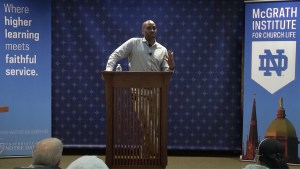Renovations often turn up interesting finds, like fossils or artifacts. When renovations began on a church in the United Kingdom in March 2022, a mysterious hidden letter led to a historical enigma.
Workmen found the 125-year-old letter behind a metal plate in the choir stalls, where it lay hidden for over a century.
Handwritten in pencil on the back of a chorister’s sermon, the letter came from a young boy facing a daunting future.
An apprehensive orphaned boy
At the time, children whose parents died often faced a hard life. They lived in institutional orphanages for a time, and then were sent out to find their way in the world at only 14 years old.
That was the case with the writer of the mysterious letter, William Elliott from the nearby Sunderland Orphan Asylum. The “leading boy” of the parish choir, he was only 13 years old.
Young William felt understandable fear and anxiety about his approaching 14th birthday, when he would be discharged from the orphanage.
We can only imagine the state of nerves a child might feel in those circumstances, and sure enough, his hidden letter is enough to rend the heart. Here is an excerpt:
“Dear friend, whoever finds this paper think of William Elliott who had two months and two weeks and four days on the 11 of August 1897. Whoever you are that finds this paper don’t tear it up or throw it away …
“Keep it in remembrance of me, W Elliott… I was the leading boy of this choir…
“I love you if you love me.”
The mysterious letter naturally attracted lots of interest.
An unexpected future
Most of all, people wondered, whatever became of this little boy? What happened to him after he left the orphanage?
That mystery has been solved, as family history researchers went to the effort of tracking down the chorister through written documents and census records. Like many children of the time, he was the son of a sailor lost at sea.
Their research indicated that William was one of 50 orphaned sons of seafaring men who lived at the Sunderland orphanage. His father, Thomas Duncan Elliot, was a chief officer who tragically washed overboard while sailing on a ship called the Skyros.
William’s mother was Sarah Elliott, a widow left with four young children, who had worked as a dressmaker to make ends meet following Thomas’ death. Prior to the father’s untimely end, that family had been financially comfortable.
William spent five years in the orphanage before he was discharged. Then his story took an unexpected turn.
The young boy from England ended up moving to America, becoming a naturalized U.S. citizen, and following in his father’s footsteps to a seafaring life. In fact, he had an honorable career in the U.S. Navy!
Research specialist Jen Baldwin has discovered what happened after Elliott left the orphanage in 1897, aged just 14.
Baldwin, who works for family history site Findmypast, found documents from March 1903 that listed Elliott’s departure from Glasgow at the age of 19, setting sail for New York with $25 in cash – worth around £650 today.
It is thought that Elliott traveled to Newport, Rhode Island, to stay with his sister. He became a Yeoman in the U.S. Navy that year, and was honorably discharged in 1916 as Chief Yeoman.
That same year, Elliott was naturalized as a U.S. citizen on a petition that also includes information on his wife, Dora, whom he married in 1908, and daughter, Edith, who was born on 26 March 1910.
The details of his Navy career are vague, but a retirement announcement in the San Diego Union shows that he progressed to the role of Commander before retiring in August 1945 after over 40 years’ service.
When the Second World War broke out, Elliott returned to service as assistant supply officer, before retiring once again in 1945.
William Elliott died on 27 April 1968. He was survived by his second wife, Florence, as well as his daughter Edith, a son, his sister, and eight grandchildren. He was cremated and interred in Arlington National Cemetery, Virginia, alongside his first wife Dora.
What a fascinating and adventurous life he had! Hopefully his apprehensive 13-year-old self would have been relieved and glad to know how well things would go.
Today, the church where the mysterious letter was found is honoring William’s wish of being remembered.
Heeding his wishes, the letter was framed and now hangs above the pew in which it was found. At the time of its discovery, center manager Tracey Mienie said, “His letter has touched us all. He was clearly very aware that his time at the orphanage, and in the choir, was ending and I think apprehension at what his future may hold comes across in his words.”
It’s so satisfying to know that things turned out well for young William. Perhaps his story can inspire other young people when they find themselves in anxiety-inducing situations as he did.




